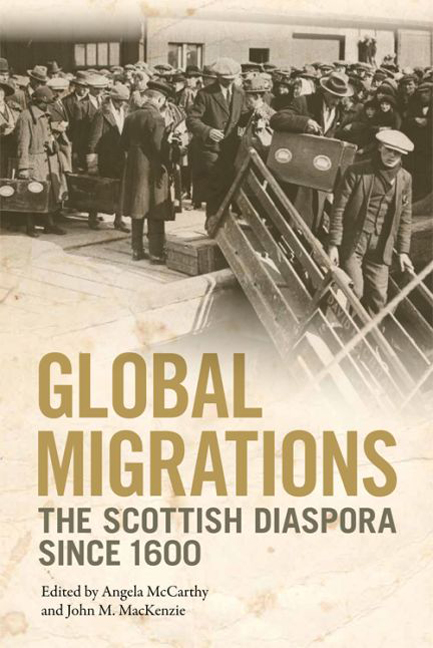Book contents
- Frontmatter
- Contents
- List of Figures and Tables
- Notes on the Contributors
- Acknowledgements
- A Tribute to Sir Tom Devine
- 1 Introduction-Global Migrations: The Scottish Diaspora since 1600
- 2 ‘As Hewers of Wood, and Drawers of Water’: Scotland as an Emigrant Nation, c. 1600 to c. 1800
- 3 ‘You Have Only Seen the Fortunate Few and Draw Your Conclusion Accordingly’: Behavioural Economics and the Paradox of Scottish Emigration
- 4 Scottish Diasporas and Africa
- 5 ‘Have the Scotch no Claim upon the Cherokee?’ Scots, Indians and Scots Indians in the American South
- 6 Conflicts of Interest, Crises of Conscience: Scots and Aboriginal People in Eastern Australia, 1830s–1861
- 7 The Importance of Scottish Origins in the Nineteenth Century: James Taylor and Ceylon Tea
- 8 ‘Our Old World Diff'rences are Dead’: The Scottish Migrant Military Tradition in the British Dominions during the First World War
- 9 ‘Part of my Heritage’: Ladies’ Pipe Bands, Associational Culture and ‘Homeland’ Identities in the Scottish Diaspora
- 10 Understanding Scottishness among Sojourners, Settlers and Descendants in Hong Kong and New Zealand
- 11 Encountering an Imaginary Heritage: Roots Tourism and the Scottish Diaspora
- 12 Home is where the Heart is: Affinity Scots in the Scottish Diaspora
- 13 What Scottish Diaspora?
- 14 Afterword
- Index
3 - ‘You Have Only Seen the Fortunate Few and Draw Your Conclusion Accordingly’: Behavioural Economics and the Paradox of Scottish Emigration
Published online by Cambridge University Press: 23 September 2017
- Frontmatter
- Contents
- List of Figures and Tables
- Notes on the Contributors
- Acknowledgements
- A Tribute to Sir Tom Devine
- 1 Introduction-Global Migrations: The Scottish Diaspora since 1600
- 2 ‘As Hewers of Wood, and Drawers of Water’: Scotland as an Emigrant Nation, c. 1600 to c. 1800
- 3 ‘You Have Only Seen the Fortunate Few and Draw Your Conclusion Accordingly’: Behavioural Economics and the Paradox of Scottish Emigration
- 4 Scottish Diasporas and Africa
- 5 ‘Have the Scotch no Claim upon the Cherokee?’ Scots, Indians and Scots Indians in the American South
- 6 Conflicts of Interest, Crises of Conscience: Scots and Aboriginal People in Eastern Australia, 1830s–1861
- 7 The Importance of Scottish Origins in the Nineteenth Century: James Taylor and Ceylon Tea
- 8 ‘Our Old World Diff'rences are Dead’: The Scottish Migrant Military Tradition in the British Dominions during the First World War
- 9 ‘Part of my Heritage’: Ladies’ Pipe Bands, Associational Culture and ‘Homeland’ Identities in the Scottish Diaspora
- 10 Understanding Scottishness among Sojourners, Settlers and Descendants in Hong Kong and New Zealand
- 11 Encountering an Imaginary Heritage: Roots Tourism and the Scottish Diaspora
- 12 Home is where the Heart is: Affinity Scots in the Scottish Diaspora
- 13 What Scottish Diaspora?
- 14 Afterword
- Index
Summary
EARLY IN 1800 a group of sixteen young men left Inverness hoping to make their fortunes from the cotton plantations of Demerara and Berbice on the north coast of South America. In April of the following year a carpenter named James Fraser, who had been in Berbice since the mid-1790s, wrote home reporting the death of one of them, his own brother Sandy, who had had to borrow the five pounds he needed to make the journey, and he added the warning that ‘there is only two of the fifteen who came out with him in life’. By September, James Fraser himself was dead and the news in Inverness was that all but one of the sixteen young men had ‘dropt into their Graves’. Yet, despite this, a third and last brother, Simon, was on his way to the colony. That the deaths of so many did not deter others is the paradox of much Scottish involvement in the Caribbean.
Since 1796, when British forces had accepted the surrender of the three adjoining Dutch colonies of Essequibo, Demerara and Berbice – which would unite as British Guiana in 1831 and now form the Republic of Guyana – the region had held an allure which, notwithstanding these and many other deaths, continued to draw young men to it. According to Henry Dalton, the British colony's first historian writing in the 1850s, many who came were ‘of the Gaelic race’ and ‘of humble extraction, uneducated, and glad to accept any opening that presented itself’. Charles Waterton, an eminent naturalist whose family were plantation owners and who himself spent time in Guyana, later recalled how ‘shoals’ of poor Scotsmen had arrived in Berbice hoping for sudden wealth and of how once, according to what he has heard, ‘forty of them lay on the beach and drank rum until they were all dead’. No doubt this was an exaggeration but the story suggests that the influx of young Scots had left its mark on the popular imagination. It was common to call these men ‘adventurers’ and, because a number of the ‘early adventurers’ had come from northern Scotland, the attraction of Guyana was especially strongly felt in and around Inverness, the largest town in the Highlands.
- Type
- Chapter
- Information
- Global MigrationsThe Scottish Diaspora since 1600, pp. 46 - 62Publisher: Edinburgh University PressPrint publication year: 2016

